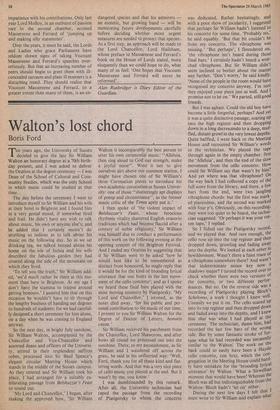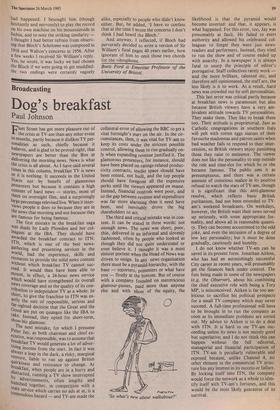Walton's lost chord
Boris Ford
rren years ago, the University of Sussex
decided to give the late Sir William Walton an honorary degree as a 70th birth- day present, and I was asked to deliver the Oration at the degree ceremony — I was Dean of the School of Cultural and Com- munity Studies, which was the only School in which music could be studied at that time.
The day before the ceremony I went to introduce myself to Sir William and his wife at their hotel in Brighton and I found him in a very genial mood, if somewhat tired and frail. He didn't have any wish to talk about music, his own or anyone else's; and he added that I certainly mustn't do anything so tedious as to talk about his music on the following day. So as we sat drinking tea, we talked instead about his home on the isle of Ischia and his wife described the fabulous garden they had created along the side of the mountain on which they lived.
`To tell you the truth,' Sir William add- ed, 'we'd much rather be there at this mo- ment than here in Brighton. At my age I don't have the stamina to traipse around getting honours.' I assured him that on this occasion he wouldn't have to sit through the lengthy business of handing out degrees to hundreds of students: for we had careful- ly designed a short ceremony for him alone, on a day when he was coming to England anyway.
So the next day, in bright July sunshine, Sir William Walton, accompanied by the Chancellor and Vice-Chancellor and assorted deans and officers of the Universi- ty, attired in their resplendent saffron robes, processed into Sir Basil Spence's elegant circular Meeting House which stands in the middle of the Sussex campus. As they entered and Sir William took his place, I had arranged for a suitably ex- hilarating passage from Belshazzar's Feast to sound out.
'My Lord and Chancellor,' I began, after making the approved bow, 'Sir William
Walton is incomparably the best person to utter his own ceremonial music: "Alleluia, then sing aloud to God our strength, make a joyful noise". Were it not to give ourselves airs above our common station, I might have chosen one of Sir William's three Coronation pieces to introduce his own academic coronation at Sussex Univer- sity: one of those "shatteringly apt displays of pomp and circumstance", as the former music critic of the Times aptly put it.'
I then spoke of 'the violent impact of Belshazzar's Feast, whose ferocious rhythmic vitality shattered English oratorio traditions which had become flaccid after a century of noble religiosity.' Sir William was. himself due to conduct a performance of this work on the following evening at the opening concert of the Brighton Festival. And I ended my Oration by suggesting that if Sir William were to be asked 'how he would best like to be remembered as distinct from honoured, he might reply that it would be for the kind of brooding lyrical utterance that one hears in the last move- ment of the cello concerto': and as I spoke we heard these final bars played with the most moving intensity by Piatigorsky. 'My Lord and Chancellor,' I intoned, as the notes died away, 'for his public and per- sonal contribution to the music of our time, I present to you Sir William Walton for the Degree of Doctor of Letters, honoris causa.'
Sir William received his parchment from the Chancellor, Lord Shawcross, and after bows all round we processed out into the sunshine. There, to my astonishment, as Sir William and I wandered off across the grass, he said in his unflurried way: 'Well, Ford, thank you for all those kind and flat- tering words. And that was a very nice piece of cello music you played at the end. But it wasn't by me, you know.'
I was dumbfounded by this remark. After all, the University technician had taped the passage from the recording of Piatigorsky to whom the concerto
was dedicated. Rather hesitatingly, and with a poor show of jocularity, I suggested that perhaps Sir William hadn't listened to his concerto for some time. 'Probably no,' he said equably. 'But that bit couldn't be from my concerto. The vibraphone was missing.' But perhaps', I floundered On, 'the vibraphone isn't heard during those final bars.' I certainly hadn't heard a wret- ched vibraphone. But Sir William didn't seem inclined to bother about the matter any further. 'Don't worry,' he said kindly. 'None of the people in the room would have recognised my concerto anyway. I'm sure they enjoyed your piece just as well. And I promise not to let on.' We parted, still good friends.
But I was aghast. Could the old boy have become a little forgetful, perhaps? And yet it was a quite distinctive passage, soaring UP into the high register and then dropping down in a long decrescendo to a deep, muf- fled, distant growl in the very lowest depths. Quite baffled, I went back to the Meeting House and recounted Sir William's words to the technician. We played the tape through again in the empty chamber: first the 'Alleluia', and then the end of the slow movement from the cello concerto. How could Sir William say that wasn't by him? And yet where was that vibraphone? On the way back I had collected a copy of the full score from the library, and there, a few bars from the end, were two jangling vibraphone chords: but the first was mark- ed pianissimo, and the second was marked with four p's. Obviously, on this recording, they were too quiet to be heard, the techni- cian suggested. 'Or perhaps it was your rot- ten tape,' I replied. So I fished out the Piatigorsky record, and we played that. And sure enough, the cello rose up into the top register and then dropped down, 'growling and fading awaY into the depths. We looked at each other in bewilderment. Wasn't there a faint trace of a vibraphone somewhere there? And wasn't that indeterminate minor key now a shadowy major? I turned the record over to check whether there were two versions of the concerto, or two different perfor- mances. But no. On the reverse side was 'a recording of Piatigorsky playing Bloch s Schelomo, a work I thought I knew well.
Uneasily we put it on. The cello soared UPinto its top register and then dropped down and faded away into the depths, and I knew that that was what I had played at the ceremony. The technician, damn him, had recorded the last few bars of the wrong side. But by some fantastic stroke of for- tune what he had recorded was uncannily similar to the Walton'. The work on the back could so easily have been a Haydn cello concerto, con brio, which the con- gregation in the Meeting House could hard- ly have mistaken for the 'brooding lyrical utterance' by Walton. What a Sitwellian moment that would have been! Whereas the Bloch was all but indistinguishable from the Walton: Bloch hadn't let on' either.
During the next few days I felt that I must write to Sir William and explain what had happened. I besought him (though hesitantly and nervously) to play the record on his own machine on his mountainside in Ischia, and to note the striking similarity
I thought I had better refrain from observ- ing that Bloch's Schelomo was composed in 1916 and Walton's concerto in 1956. After a few weeks I received Sir William's reply. Yes, he wrote, it was lucky we had chosen the Bloch if we were going to get muddled: the two endings were certainly vaguely
alike, especially to people who didn't know either. But, he added, 'I have to confess that at the time I wrote the concerto I don't think I had heard the Bloch.'
And anyway, I reflected, if Bloch had perversely decided to write a version of Sir William's final pages 40 years earlier, how ignorant of him to omit those two chords for the vibraphone,
Boris Ford is Emeritus Professor of the University of Bristol.















































 Previous page
Previous page